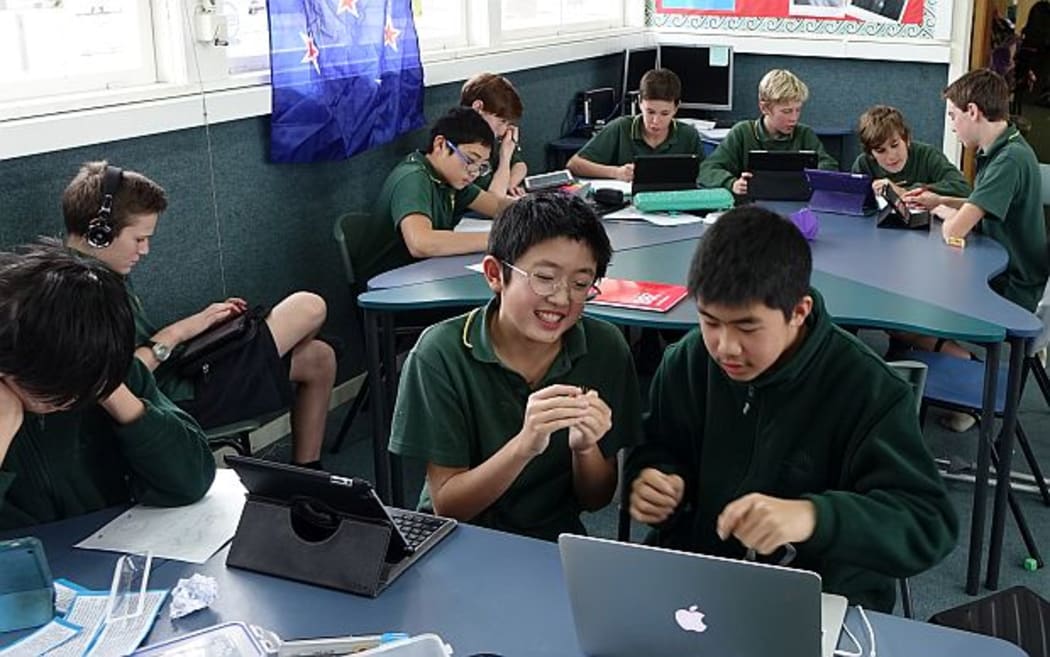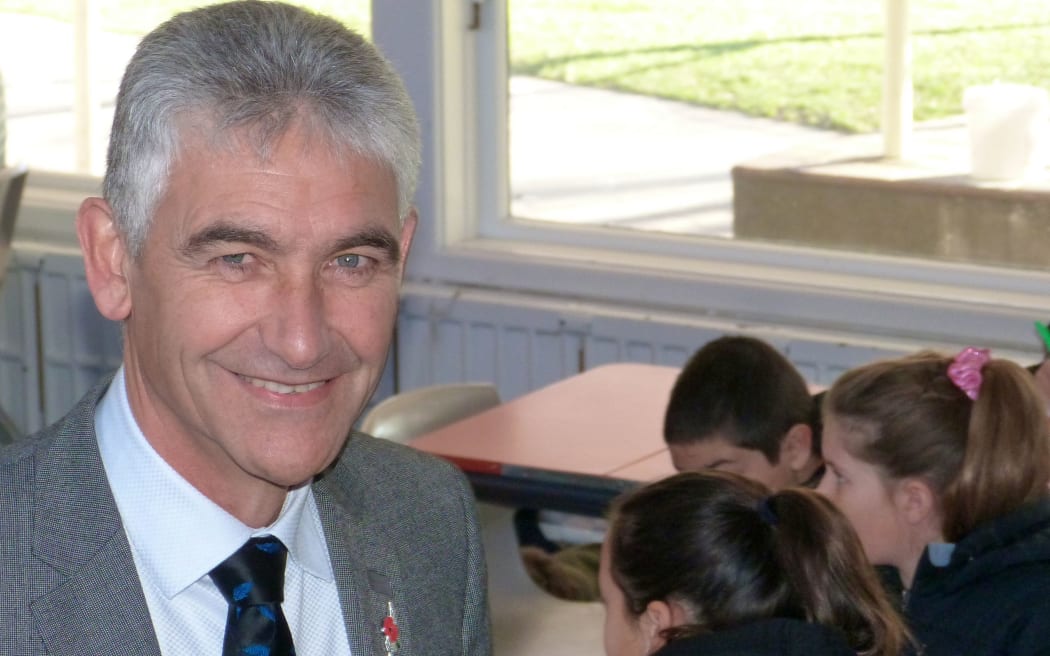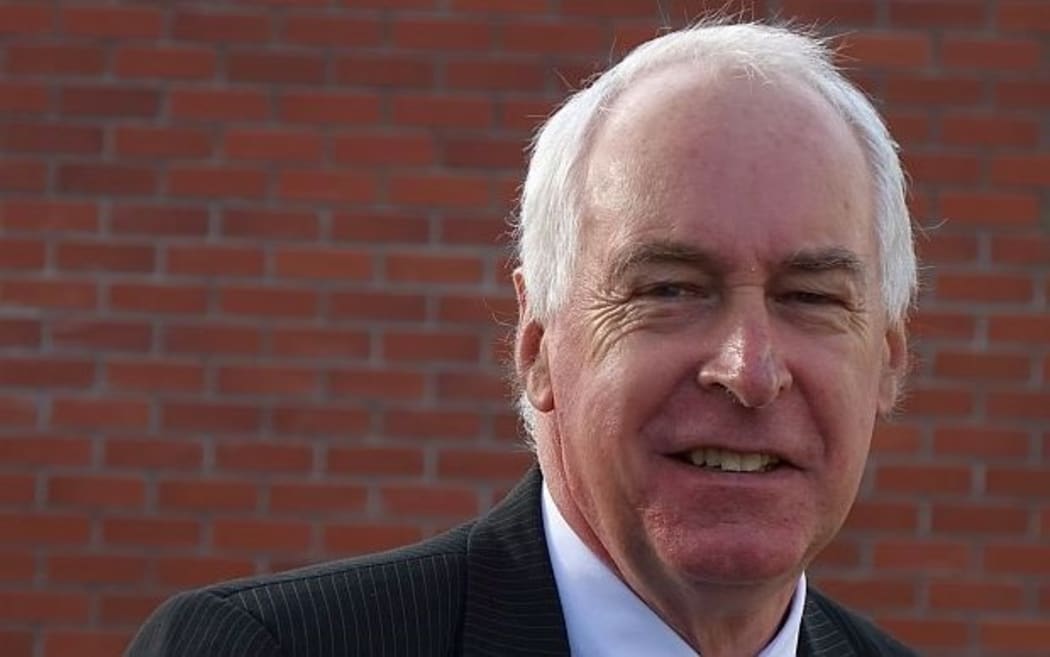Renwick School near Blenheim is among 222 schools that have signed up to the Government's $155 million a year plan for raising student achievement. But other schools are less enthusiastic.

Children at Murrays Bay Intermediate School - one of eight schools in the Mid Bays community of schools in Auckland. Photo: RNZ / John Gerritsen
Listen to Insight: Top Teachers - Divided Schools
The Investing in Educational Success or IES scheme puts schools into groups and pays some teachers and principals more to lead improvements.
Renwick School principal Simon Heath is keen on the plan. He says it is potentially the biggest change since 1989, when the Tomorrow's Schools initiative transformed the school sector.
"We see it as a massive opportunity to grow the quality of education that we're delivering to students across our region because it means that our very brightest and best teachers are able to influence right across the community."

Renwick School principal, Simon Heath. "It is the most significant educational initiative since Tomorrow's Schools in '89." Photo: ( RNZ / John Gerritsen )
Mr Heath says the Blenheim Community of Schools includes 21 schools, and though it has not yet begun it has already changed things.
"We've always thought about that five-year-old starting with us and us getting them ready for secondary school. Well, our mindset has changed now. Our mindset is when that child starts with our school, we now invest in them to get to NCEA level 3. So we are investing from five to 18 years and beyond."
Each group of schools has to identify common problems to work on. In Blenheim the schools will focus on raising achievement of the National Standards in reading, writing and maths from about 78-80 percent to 85 percent, and increasing NCEA achievement rates to 85 percent. It also wants to improve students' behaviour with fewer absences and late arrivals, and fewer stand-downs and suspensions.
But not everybody is on board.
Just two days before Radio New Zealand visited Blenheim, the board of trustees at Redwoodtown School in Blenheim decided to adopt a more cautious approach to the community of schools.
School principal Gary Hildyard says the school will wait and see if an alternative scheme the Educational Institute (NZEI) is negotiating is a better bet than Investing in Educational Success.
Mr Hildyard says he is not convinced the IES model is the best way to raise student achievement.
"We need to get at the chalkface with the students and put more support in with the students themselves. It may mean looking at smaller classes, it may mean more teacher aide time to provide another adult in the classroom, and that would give teachers more time to work with individual students.
"But I think it's far better than a top-down model of someone as a lead teacher coming in and telling teachers how to do something, especially if they are not from that school and don't understand exactly how that environment and that community works."
Principal of Campbell's Bay School in Auckland John McGowan, also has reservations about the IES.

Campbells Bay School principal, John McGowan. Initially opposed to the government's scheme, he can see it working well for schools in his part of Auckland. Photo: ( RNZ / John Gerritsen )
He says the Education Ministry's insistence on a single principal holding the lead role is an Achilles' heel.
"It's not a terribly good model in the sense that it places huge burden on the principal leader and their school," he says.
Even so, Mr McGowan says he is in favour of the scheme because of the professional development it will provide for his staff.
But many primary school teachers and principals are opposed to the scheme.
The NZEI has refused to include the new teaching roles created by the IES in the primary school teachers' collective agreement.
However, it has not entirely shut the door on the Government's scheme. It is negotiating an alternative with the Education Ministry, and it is expected to share many of the original scheme's features, such as grouping schools together and providing extra pay for some teachers and principals.
President of the NZEI Louise Green says the alternative, known as the 'Joint Initiative', will include early childhood centres in its clusters and there will not be one principal in charge of each group.
"We've identified different types of leadership for different purposes and different people taking on different roles, so there isn't just one leader, there are multiple leaders."
The Ministry of Education's head of sector enablement and support, Katrina Casey, is confident the scheme will have a big impact because they will cover children's entire progress through the school system.
"It's not pepper-potting little bits of a journey. It's looking at the actual journey that kids in a particular community take. And it's also recognising great teachers and sharing practice."
Regardless of the precise details of the 'Joint Initiative', it appears every school in the country will soon be able to join a Government-funded cluster to tackle common problems and teachers will have access to a new career path.
The impact on the school system of those two interwoven strands could be profound.
But it could go a lot further.
Ms Casey says the basic approach of grouping schools together could lead to major changes.
"This really could be the biggest systems change that we've had, probably since Tomorrow's Schools, because we could potentially see quite a lot of scope for decision-making to occur at a communities level," she says.
"Anything now that requires decisions to be made across more than one school by and large has to be done at the ministry level and that really doesn't make sense when you think about it.
"So take, for example, decisions about schools and how many you have and where you have them and whether you open them or whether you close them - those sorts of decisions would be much better made across and within communities of schools than by the ministry."
She says she's speculating, but the suggestion that more decisions could and should be made locally has been a common theme from Education Ministry leaders in recent years.
And if it happens, the Government's initiative will go beyond simply raising children's achievement to revolutionising the entire school system - for better or for worse.

